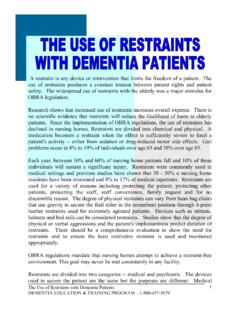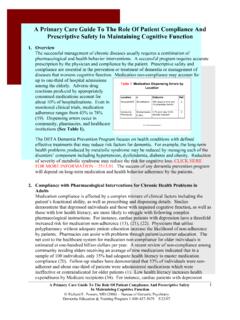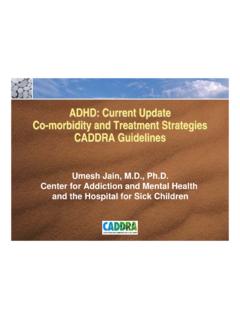Transcription of A HANDBOOK FOR ADULTS WITH MEMORY …
1 A HANDBOOK FOR ADULTS with MEMORY PROBLEMS OR DEMENTIASTEP 1: UNDERSTANDING HOW YOUR MEMORY WORKSM emory problems are a common complaint in older persons. The brain has two kinds of MEMORY recent and remote. Recent MEMORY includes facts or events that occurred within several hours, while remote (old) MEMORY stores facts or events from the distant past, for example, college memories, high school memories, etc. Your brain works like a PC (personal computer). Your recent MEMORY is like the computer workstation while remote or old MEMORY is like the hard disk. The brain remembers facts or events by loading them into recent MEMORY , a part of the brain like a workstation on your computer. Then your brain moves them to old MEMORY , like the hard disk. Unimportant information is not stored. Your hard disk becomes saturated somewhere around 40 to 60 years of age and after 60 it becomes slightly more difficult to hold on to facts or events. Scientists recognize four general types of MEMORY states for older people: 1) good as new, 2) good as almost new, 3) mild impairment, and 4) dementia .
2 Good as new means that you can remember things as well as when you were 20 or 30 years of age. Good as almost new means that it s harder to remember large amounts of new information but you can still commit normal amounts of information to MEMORY . Mild impairment, sometimes called mild cognitive impairment, means that your MEMORY is impaired to the point where you have difficulty, but you do not have other evidence of dementia . dementia means that MEMORY is lost and other intellectual functions are also damaged, for example, communication, motor skills. dementia will disrupt your normal 2: UNDERSTANDING THE DIFFERENT TYPES OF MEMORY PROBLEMSSome older people are good as new but many older people will complain that their MEMORY requires more work than when they were 20 or 30, or good as almost new . Good as almost new takes longer to memorize large amounts of new information. This increased MEMORY effort is a normal part of aging and is not considered part of dementia .
3 Mild cognitive impairment means that a person has a specific MEMORY problem that affects their everyday life and requires special interventions, for example, MEMORY books, frequent reminders, etc. dementia means that a person is seriously impaired. A good example of each type of MEMORY problem is a trip to the store. A normal, young person can be given a list of 15 items and go to the store where they remember 14 items. A good as new MEMORY will function the same way. A good as almost new MEMORY may come back with 10 or 11 items and the person is upset that they cannot remember the last 3 or 4 items. A mild, cognitive impairment person would go to the store and get 2 or 3 items or no items or may have trouble remembering where the store is located. A demented person may not be able to find the store or remember why they were in the parking lot of the store. A HANDBOOK FOR ADULTS with MEMORY PROBLEMS OR DEMENTIAR ichard E. Powers, MD (2006) Bureau of Geriatric Psychiatry 5-7-07 1 STEP 3.
4 WHAT IF I HAVE FAMILY MEMBERS with dementia ? WHAT IS THE ROLE OF GENETICS?Genetics refer to human genes that control all aspects of our body and life. Genes are highly complex proteins and each human being has a unique set of genes. Genes can wear out over time. Genetic disorders mean that a person inherit the disease from one or more relatives. Every cell in the human body has a complete set of genes. Genes can cause body malfunction by producing defective proteins or by interacting with other health conditions to cause disease. Some genetic causes of dementia , like Huntington s disease, are almost always unavoidable when the gene is present. Other genetic disorders are more complex and cause disease when certain other health problems occur in middle or later life. A small number of persons with Alzheimer s disease (2% or less) have genes that destine them to develop dementia . This gene causes intellectual loss early in life. Most people develop dementia in later life.
5 Late onset dementia has certain genes that maybe risk factors for developing intellectual loss; however, some people may not get the disease even if they have some of the risk genes. The gene for the protein APOE is considered a risk gene for dementia and the presence of high risk APOE (APOE 4) may cause a person to develop intellectual loss 10 years before their brain will show this change under normal circumstances. Genes may account for between one-third and two-thirds of risk factors for older people. This fact means that environment and life choices may also account for one-third to two-thirds of dementia . Genes are very complicated parts of the human brain cells and scientists presently lack the ability to repair broken genes. While scientists study ways to fix damaged genes, people can work on other risk factors that may work with genes to reduce the risk of Alzheimer s disease. Certain kinds of dementia , such as alcohol-induced dementia and vascular dementia , probably have no significant genetic risk.
6 STEP 4: WHAT CAN BE DONE?All new clinical research shows that early intervention for dementia will significantly slow the loss of memories. Any person over the age of 65, who believes that they are suffering from MEMORY problems, should have an evaluation by a doctor. A dementia evaluation must be conducted by someone who is trained to assess intellectual function, for example, geriatrician, psychiatrist, neurologist, neuropsychologist, or other professionals with specific training in the early recognition and diagnosis of dementia . Early dementia cannot be diagnosed with a brain scan such as MRI or blood test. Mild cognitive impairment and early dementia require a careful evaluation by a specialist that takes about one hour of the doctor s HANDBOOK FOR ADULTS with MEMORY PROBLEMS OR DEMENTIAR ichard E. Powers, MD (2006) Bureau of Geriatric Psychiatry 5-7-07 2 Persons with evidence of dementia should receive appropriate therapy. People with mild MEMORY impairment may choose to take medication that slow MEMORY loss.
7 People with simple MEMORY complaints, , good as almost new , need follow-up evaluations but no therapy. People with normal intellect do not need any investigation, but rather congratulation for holding on to their youth-like intellectual vitality. Present medical technology that is available to patients cannot predict the early onset of dementia ; however, specialized scanning, , PET scans, probably predict risks for dementia in some groups of at-risk individuals. A specialist can advise you on the availability and wisdom of seeking a PET scan. Most people should not have PET studies; however, some high-risk individuals may be candidates for PET FACTS ABOUT DEMENTIAWHAT IS THE MEANING OF dementia ? dementia is the loss of multiple intellectual functions over time. dementia is caused by many diseases including Alzheimer s disease, strokes, and alcohol abuse, as well as many others. Intellectual loss often begins with MEMORY problems and then progresses to communication difficulties or problems with complex motor skills like driving.
8 No two persons with dementia follow the same path. Some individuals may develop MEMORY problems and then remain stable for years. Scientists cannot predict the course of a person s intellectual can be caused by many types of brain diseases. Each disease has a different course and treatment. Genetics play some role in the development of dementia , although family history cannot predict the speed at which your symptoms will can be produced by Alzheimer s disease, multiple strokes (vascular dementia ), alcohol abuse, or many other diseases. Some health problems can hasten the onset of intellectual loss and speed the progression of symptoms. Serious heart disease or uncontrolled high blood pressure may further damage a person s brain. The person with dementia should do everything possible to control health problems that may cause or worsen intellectual problems. Individuals should seek healthcare for heart problems and follow doctor s instruction to control irregular heartbeats or high blood pressure.
9 Persons with thyroid disease or vitamin deficiencies should have appropriate medical therapy. Alcohol abuse and prescription drugs can worsen MEMORY problems. Anybody with dementia should stop drinking completely. Persons with dementia should limit the use of mind-altering drugs and avoid all other over-the-counter medications that cause drowsiness or confusion. Persons with dementia need to keep their brains as clear as possible. A drug advisory is provided that lists medications which can cause confusion or other serious side effects for persons with Alzheimer s disease. A HANDBOOK FOR ADULTS with MEMORY PROBLEMS OR DEMENTIAR ichard E. Powers, MD (2006) Bureau of Geriatric Psychiatry 5-7-07 3 WHAT THINGS WILL WORSEN MEMORY PROBLEMS?Heavy drinking, excessive amounts of mind-altering medications, like sleeping pills or nerve pills, and poor medical care will probably worsen the symptoms of dementia . Medications with an anticholinergic side effect , that cause dry mouth and blurred vision, may increase confusion.
10 People with dementia must do everything to keep their brain healthy and functioning for as long as possible to enjoy their family and friends. CAN I PREDICT THE COURSE OF MY MEMORY PROBLEMS?The course of MEMORY loss is dependent upon the causes of the intellectual problem . There is no fool-proof, clinical test that absolutely distinguishes one type of dementia from another. Each patient has a different course for his or her disease. Many patients progress very slowly, especially those who undergo treatment. Sometimes patients can plateau and retain a certain level of function for months or years. The best strategy to deal with dementia is to take life one day at a time and enjoy every moment with your family and friends. HOW DOES FAMILY HISTORY PREDICT MY RISK FOR DEVELOPING dementia ?The risk for developing dementia depends on the specific kind of brain disease that produces the MEMORY loss. For example, alcohol-induced dementia has no family risk factors except for the genetic risk of alcoholism.










